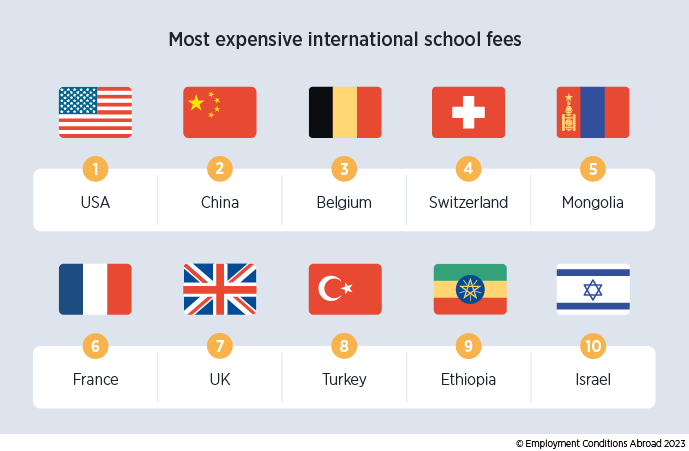The past two years have seen significant changes in the costs of childcare and education in the face of high inflation. Governments around the world have used various levers to try to lower inflation, but while rates have eased in many countries, inflation continues to drive rises in the cost of education and childcare around the world. Our latest Education Reports show a 5% increase in average fees for international schools in 2023, and 6% increases in nursery costs.
School fees rising globally
International schools around the world are passing on increased operating costs to parents in the form of higher fees. Rises in the costs of energy and school equipment mean increased overheads for schools, and significant increases in staffing costs mean that elevated tuition fees are inevitable.
Due to the global nature of the forces causing high inflation, fee increases are not restricted to one particular region. The greatest increases have been seen in Africa and Europe, where fees are over 5% higher in 2023 than in 2022, while fees in the Middle East rose by less than 3%.
International school education remains the most expensive in the United States, where secondary school fees average USD 47 200 per year. Elsewhere, fees are typically highest in Asia and Europe, where secondary tuition averages USD 25 400 and USD 24 500 respectively. High inflation has led Turkey to enter the top 10 most expensive countries in the world for international schooling, rising to 8th place this year compared to 13th place in 2022. In Africa, the weakening of local currencies has been a key driver of fee increases, as many schools set their fees in US dollars.

Nursery fees continue to surge
Parents with children below school age are also facing significant increases in the cost of childcare. According to ECA’s annual survey, which covers nursery costs in over 50 countries, the average cost of childcare saw a 5% increase in 2023, following a similar trend in the previous year.
While nursery fees rose globally, some of the greatest increases were seen in Europe, with increases of over 10% in a number of countries including Germany, Hungary and the United Kingdom.
| Countries with high increases in nursery fees |
|
Country
|
Fee change
(2022 - 2023)
|
|
Hungary
|
14%
|
|
Serbia
|
14%
|
|
Germany
|
13%
|
|
Egypt
|
11%
|
|
Czech Republic
|
10%
|
|
Romania
|
10%
|
|
United Kingdom
|
10%
|
|
Bulgaria
|
9%
|
|
United States of America
|
9%
|
|
Poland
|
8%
|
Operating costs for nurseries have been the main driver of fee increases. While energy price rises have started to ease from the spikes following Russia’s invasion of Ukraine, the cost of heating and lighting childcare facilities mean large overheads for nurseries. Staffing costs continue to surge due to inflationary pressures and rents for nursery premises have also been hiked. Many nursery fees include the cost of meals and ongoing price rises for food have also led to many providers passing on these costs to parents. Competition for nursery places is also high as more parents return to in-person work arrangements.
The global average annual cost of full-time childcare is USD 13 000, but costs can vary significantly by country. The United States remains top of our rankings for childcare, with average annual costs of USD 43 400. In contrast, costs are significantly lower in many European countries, where childcare is subsidised. Even so, in many countries with subsidised childcare, fee contributions for parents are indexed to inflation figures.
We are starting to see inflation cool in many countries around the world. As fees for schools and full-time childcare are so closely tied to inflation, the rate of fee increases may slow in future in line with prices for other goods and services.
FIND OUT MORE
ECA’s Education Reports contain listings of tuition and other fees for international schools in 168 countries, so you can fully budget for this important assignee benefit. ECA conducted research on over 2 800 schools around the world during 2023 to bring ECA subscribers the latest figures. Fees for nurseries, childcare providers and babysitters can be found within the Childcare section of ECA’s Education reports. We will be updating our Education Reports in March next year when we will see how school fees have changed in Southern Hemisphere countries.
Our detailed and extensive benefits data is also available to use pre-loaded in our assignment cost projections, which can be purchased on demand or through our Assignment Management System, ECAEnterprise.
Please contact us to speak to a member of our team directly.